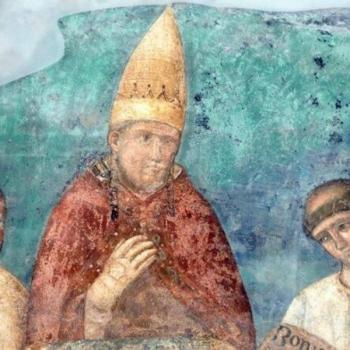Many faithful Catholics wonder what has happened to the faith in Western Europe. The answer certainly is not cut and dry, especially because there are still many faithful and ardent Catholics throughout the continent. Yet one can certainly speak of numerous historical events that have slowly fractured the relationship between the Church and Europeans.
Some years ago I read the book Good-bye to All That by the English World War I soldier Robert Graves. Graves’ biography gives us a glimpse into what has happened to faith in twentieth century Europe. The experience of two world wars has certainly affected the European collective psyche leaving Europeans with great doubts about God and fellow men.
I came across this paper I wrote nine years ago that explores the war experience of Robert Graves, a traumatic experience that led him to say “good-bye” to God and society as a whole. It is easier to understand the decrease of fervor in the Western European Church when exploring the first half of the twentieth century. It seems to have become a suicidal society where little hope for the future is present, despite the hope European union should inspire by the creation of the European Union. Horrific trench warfare and the death of millions of young men during World War I left a deep wound in Europe, and this paper explores the extent of that wound.
———
The Great War of 1914 abruptly ended millions of uncompleted lives, shattering millions of individual dreams. One of the millions of these people with crushed lives was Robert Graves, a man who was not only altered by his experiences throughout the war, but also recognized the transformation of his society in England. After experiencing the unimaginable atrocities of war during young adulthood, Graves lost hope in mankind. Graves was one of millions of Englishmen who returned home to confront a new disillusioned society with multitudes of men suffering intensely from physical and psychological disabilities particularly due to fighting in the trenches of the Western front. This numbed his innermost feelings and haunted him for the rest of his life, leading Graves to alienate himself from society through his loss of hope in humanity expressed through his decrease of interest and dependence on religion and humankind.
After experiencing the slaughter of trench warfare, Graves lost his belief and hope in God. Graves was raised in the Church of England as the vast majority of Englishmen and was taught that his church was superior to all others on the isle especially Roman Catholicism. At Charterhouse, Graves was confirmed, and when reflecting back on the occasion, he sarcastically recognized that “the Holy Ghost failed to descend in the form of a dove… and nothing spectacular happened (Good-Bye to All That, 47).” At this young age, he strongly believed in his faith, but the comment reflects an older Graves recognizing this event as a childish and meaningless point in his life where God should have touched him. Several specific events marked Graves’ wartime career transforming him from a practicing Christian to a non-believer. Graves stressed that it was impossible for soldiers to be religious in the trenches. They experienced such bloody and crude conditions that they no longer could hold religious convictions in their surroundings, so they replaced religion by a virtual religion of war, as evidenced in Grave’s Second Battalion where the captain replaced the word “concentrate” before giving orders to fire with “consecrate.” The enemies were consecrated for the mother country instead of gifts being consecrated for God. Anglican chaplains were not respected due to their lack of courage, they only traveled to the front when things were calm, buried the dead, brought materials, and quickly returned to safe areas. Anglican preachers spoke of the duty to pay tithes before soldiers fought, most likely the last matter in any soldier’s mind. Graves did praise the Roman Catholic chaplains who were present during battles ready to anoint the dying and bless soldiers before battles, promising heaven for them if they died (Good-Bye, 190). Despite his respect for the Catholic chaplains, Graves could not appreciate them as a result of the repulsion towards the Catholic Church instilled in him by his mother and English society. The Anglican soldiers felt betrayed when their own chaplains were not present at their time of need and support.
While on leave on April, 1916, Graves attended church for the last time at the request of his mother. After fighting in the war seeing men blasted, suicide, and experiencing the violence that results from war, he rightfully had trouble believing that there even was a God. His parents “believed that God stood squarely behind the British Expeditionary Force (Good-Bye, 199),” but Graves’ experiences had proved otherwise because he had not found God in the trenches. After the war, Graves visited a Benedictine monastery at Quarr, where he found peace resting and spending time with monks. He acknowledged to the father superior that he was not very religious yet Graves admired and envied the monks who lived at peace. Graves’ religious state was like the old Norman church he encountered during the war. The inside of the church lay in ruins with “rubbish, broken masonry, smashed chairs, ripped canvas pictures, bits of images and crucifixes, muddied church vestments rotting…(Good-Bye, 117)” and the church was now used as a lookout tower by the military. Inside his being, the war had smashed and crippled him the same way that soldiers had destroyed the small church. All the pieces still remained inside Graves similar to the pieces that lay on the floor of the church, since he could still admire the religious zeal of the monks and the improvement of the clergy after the war, but he could not accept this because he had been taken over by his war experience (Good-Bye, 304). His whole self was engulfed at a young age by the war, which shattered him as a spiritual being resulting in a total loss of hope in God that for centuries had given security and hope to European communities. The war erased religion from many men’s thoughts after they faced the wickedness of war, providing a starting point for the decline of religious values and convictions throughout the twentieth century.
After loosing his spirituality, Graves’ experiences with death and change in English society made him loose his hope in humankind since there no longer seemed to be a clear mission in life. When Graves’ mother exclaimed, “our race has gone mad! (Good-Bye, 69)” she embodied in a few words the transformation of society caused by the change of the mindset of its members. The Generation of 1914 which Robert Wohl discussed, found itself in a world where an individual’s life was no longer respected and soldiers became a commodity or simply statistics. This frustration led soldiers to commit suicide like the man Graves described who had a hole in the back of his head after turning his rifle to himself (Good-Bye, 103). Graves became numb towards death giving explicit descriptions and always recounting when and where every man he met died in battle. The conditions at the trenches were inhumane, where soldiers rarely slept and used whiskey as an instrument for survival. Graves recounted that in ten days, he only slept eight hours and drank one bottle of whiskey per day to stay alive. Every night he went out to gather dead bodies, which had swelled and stunk (Good-Bye, 163). After enduring these deadly conditions for years the soldiers lost their sense of belonging to humanity since they saw first hand the atrocities humans could commit. Soldiers could no longer depended on or trust other humans since they had seen the evil tendencies of mankind.
When Graves returned to England on leave and after the war, he found a different society to which he could not adapt. Graves wanted the war to end and believed that its “continuance seemed merely a sacrifice of the idealistic younger generation to the stupidity and self-protective alarm of the elder (Good-Bye, 245).” Tensions widened the generation gap as the conflict continued and more young men died for no apparent reason. During a period on leave, Graves realized that people at home glorified the war but had no evidence to justify it since they had not experienced the horrors of the trenches. This greatly annoyed him and led him to state that he “couldn’t stand England any longer (Good-Bye, 238).” Once the war ended, Graves attempted to reincorporate himself to society and contemplated being a farmer, a trade that could provide alienation from society. He soon found himself demobilized, married to Nancy with several children, and working at Oxford University endorsing socialist ideas. He attempted to continue his life within English society, but was impaired by memories from the war that caused him severe psychological troubles. Responsibility for the change in society lay primarily on the changes in the mentality of its members, which was dominated by psychologically torn soldiers like Graves and the older generation who had placed this emotional burden on its descendants. Graves transferred to Cairo, Egypt, to become a distinguished professor at the Cairo University, but he did not feel satisfied. He returned to England but failed to reincorporate into society, greatly disappointing his parents. His marriage broke apart, and he later fled to isolation with a new wife to the island of Mallorca where he hid not only from English society, but also from humankind.
Robert Graves exemplified in his autobiography the life of the common English soldier during and after World War One. He embodied the frustration and disillusionment of war and death followed by a decrease and almost disappearance of hope and trust in God and humanity. Graves wrote a eulogy for religion and humanity with clear justifications that sprung from his experiences in the war. His society was transformed from within as its members changed after the war, so Graves found no other alternative but to retrieve from the world saying good-bye to any interest and dependence on religion and humankind. In the years following World War One, the men who fought valiantly suffered like Graves as they attempted to rebuild their lives amidst physical and psychological trauma. They found themselves living in a world that no longer valued religion and human beings the same way as before, revolutionizing the social mindset of the time and laying the foundation for the twentieth century.












